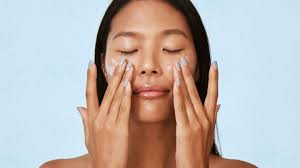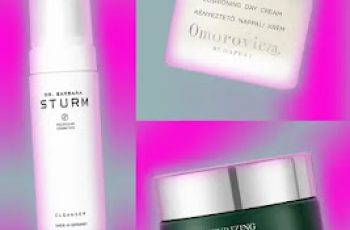
What Is the Skin Barrier? Function, Signs of Damage, and How to Care for Yours
Want to know the first step in addressing any skin concern? According to TikTok: Repair your skin barrier first. A term you used to hear only from your dermatologist during an appointment is now bandied about in casual conversation. Today, #skinbarrier has 5.2 billion views and counting on TikTok.
What Is the Skin Barrier, and How Does It Work?
The skin barrier is the outermost layer of the skin. Skin consists of three layers: the epidermis, the dermis, and the hypodermis, per Cleveland Clinic. The epidermis is the top layer of skin, and the very outermost layer of the epidermis is called the stratum corneum. “When we talk about the skin barrier, we’re referring to the stratum corneum,” says Abigail Waldman, MD, an assistant professor at Harvard Medical School and the clinical director of the Mohs and dermatologic surgery center at Brigham and Women’s Hospital in Boston.
The stratum corneum, Dr. Waldman explains, functions like a brick wall around the skin and is made up of keratinocytes that are arranged like flat bricks combined to create a shield. In the “mortar” are proteins and lipids to keep those bricks together.
What Is the Purpose of the Skin Barrier?
To put it simply, the skin barrier prevents things from escaping (such as moisture) while also preventing things from getting into your skin that you don’t want (allergens and viruses). Here are three main functions of your skin barrier.
Keeps Skin Moisturized
The skin barrier helps your skin retain water so it’s supple and properly hydrated, notes Harvard Health Publishing. Dry skin, as a result, can be flaky and more prone to irritation and itch. What’s more, well-moisturized skin appears plumper, which counteracts signs of premature aging, notes the American Academy of Dermatology.
Plays a Role in Immunity
Your skin plays a critical role in your health, and is your body’s first-line defense against things that can make you sick. “When the skin barrier is compromised, it can increase the risk of infection, allergic reaction, irritation, itching, and pain,” says Lauren Ploch, MD, a board-certified dermatologist in Augusta, Georgia.
Protects Against UV Radiation
The outermost layer of skin, called the stratum corneum, provides the first source of protection against the sun’s damaging ultraviolet radiation, research has shown. Once UV rays penetrate skin, the damage can trigger redness, signs of premature skin aging (wrinkles, discoloration), as well as skin cancers basal cell carcinoma, squamous cell carcinoma, and melanoma. Unfortunately, UV rays also break down the skin’s barrier.
What Causes Damage to the Skin Barrier?
Fortunately or unfortunately, your skin isn’t made of steel, and Dr. Ploch says many things in the environment can compromise its integrity. These threats include:
Irritating skin-care products
Excessive water exposure
Weather changes (cold, wind, dry heat)
Irritants
Allergens
Trauma (cuts, burns, scrapes)
UV rays
Overexfoliation
In addition, a couple of factors that are out of your control can contribute to a compromised barrier, Waldman says:
Genetics can drive conditions that run in families, like eczema, says Waldman. Atopic dermatitis is one type of eczema. “Atopic dermatitis is a breakdown, or deficit, of the stratum corneum,” Waldman says. This allows water to escape and allows irritants on the outside to enter the skin.
Aging causes structural changes in skin that lead to water loss, dehydration, and skin thinning, study in the November 2019 Immunology found.
Signs and Symptoms of Skin Barrier Damage
Your skin will tell you when something’s wrong. “Your skin can become red, itchy or dry and flaky [or some combination]. These are all signs that the skin barrier is damaged,” says Carmen Castilla, MD, a board-certified dermatologist in New York City.
How to Protect and Repair Your Skin Barrier
Moisturize Regularly
Your first must-do: Keep your skin well hydrated. “Dry skin is compromised skin,” says Ploch. Choose skin moisturizers that have hydrating ingredients and can keep the skin barrier intact (or repair it when necessary). Top ingredients include hyaluronic acid, ceramides, and glycerin. More on those below.
Another option, says Waldman, is to apply a product on skin that will mimic the stratum corneum. “An ointment, like Vaseline or Aquaphor, will create a bubble around skin that mimics your natural skin and keeps water from escaping,” she says. “This is one of the most effective, cheap, and easy ways to repair the skin barrier.” The downside is these products can feel thick and greasy, which many people don’t enjoy. Choose the products based on the needs of your skin, as well as those you want to use regularly.
Choose a Gentle Cleanser
You may be surprised to hear that commonly used soaps can strip the skin of much-needed moisture and compromise its barrier, says Castilla. Choosing the right face cleanser for your skin type is key. “If you have drier skin, use a cream-based cleanser; for oilier skin, go for a foaming cleanser, which will remove some oil but not strip it altogether,” she says. Also cleanse with lukewarm water, as hot water can also remove oil.
Apply Retinoids With a Light Hand
Retinoids, which are vitamin A derivatives, are used for stimulating collagen to plump up fine lines and wrinkles, as well as increase skin cell turnover, which can lighten discolorations and fight acne. When using retinoids, especially for the first time, be aware that they’ll dry out the skin and cause some irritation.
If you have drier skin, Castilla recommends applying a retinoid once a week; oilier skin types may be able to tolerate application three times per week. Keep in mind that what your skin can handle will also depend on the seasons. Summer, with its humidity, may allow you to apply retinoids or other active ingredients that exfoliate the skin more often without causing irritation. In the wintertime, you may find that the drier indoor and outdoor air means you need to scale back your retinoid.
Soothe Skin With Colloidal Oatmeal
If skin is already red and inflamed, Castilla recommends smoothing on a moisturizer that contains colloidal oatmeal. Research shows that colloidal oats reinforce the skin barrier’s integrity and regulate oil production in the skin, among other functions, which has been shown to improve skin hydration. (The study was done by the Johnson & Johnson Skin Research Center. The brand makes products, such as lotions, with oatmeal as an active ingredient.) Colloidal oatmeal is also commonly used to relieve itching from eczema, according to the National Eczema Association.
Get Serious About Sunscreen
Finally, apply sunscreen every day, even when it’s cloudy outdoors, to protect your skin from damaging ultraviolet rays, Castilla recommends. Choose an SPF 30 or higher. A facial moisturizer with an SPF 30 is suitable for regular day-to-day use, but if you’re spending a lot of time outside sweating or going in the pool or beach, apply a sunscreen that’s designed for sport or swimming.
The Best and Worst Types of Products and Ingredients for Your Skin Barrier
Give your skin much-needed TLC by incorporating skin barrier-friendly ingredients and avoiding the top culprits that cause damage.
Best: Hyaluronic Acid (HA)
HA is a humectant, which means it attracts water from the environment to hydrate and plump skin, per research published in the August 2021 Dermatology and Therapy. Hyaluronic acid (HA) is naturally found in the body, with one-third being found in the skin. One cool thing about HA? It can hold more than one thousand times its weight in water, notes Harvard Health Publishing.
Worst: Alcohol
If you review the ingredients of common toners and astringents, as well as a variety of other products, you’ll commonly find alcohol listed. Alcohol is designed to strip oils from skin, but you need these to keep your skin barrier intact, says Castilla. Read the label on your products to make sure they’re alcohol-free.
Best: Ceramides
Ceramides make up “the most abundant lipid in the outermost layer of the skin barrier,” says Ploch, adding that amounts in the skin naturally decline with age. Reaching for a cream with ceramides will naturally replace what your skin is lacking.
Worst: Scrubs
These products strip the skin’s outer layer of the oil it needs to stay moisturized, says Waldman.
Best: Glycerin
This ingredient is a top-notch moisturizer that helps maintain the skin’s integrity, according to a review of studies on aging adults in the March 2020 International Journal of Nursing Studies.
Worst: Basic Soaps
Soaps such as bar or liquid soaps designed for the hands and body should not be used on the face, as they are too harsh for its thinner skin, says Waldman.
Summary
Your skin barrier is an important part of your skin and body’s overall health. Maintaining your skin barrier’s integrity protects skin against moisture loss, environmental irritants, and damaging UV rays. A compromised barrier — which can cause redness, dryness, and flakiness — may allow pathogens, irritants, and allergens to seep in. You can care for your skin barrier with the right soap or cleanser, generous moisturization, and regular use of sunscreen.


